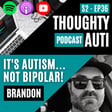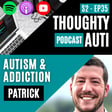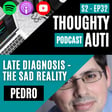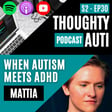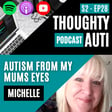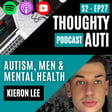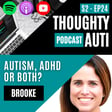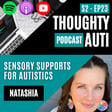
Identifying & Preventing Autistic Burnout
What are the RED FLAGS of Autistic Burnout? What are some Autistic Burnout symptoms and signs? How can you better manage your energy and regulation to avoid Autistic Burnout in the future?
Vera is the Founder of @HappyAutisticLady with her sister Ivi, which is a business offering resources, stickers, art, and speaking about Autism and Neurodiversity. Residing in the UK and the Czech Republic, Vera works with the Ambitious About Autism youth network and within Civil Services, where she looks at governmental papers, and trains Mental Health workers to understand Autism alongside the MIND charity.
My Links - https://linktr.ee/thomashenleyUK // Vera’s Insta - https://instagram.com/happyautisticlady?igshid=MmJiY2I4NDBkZg==
Dbud Noise Cancelling Adjustable Ear Buds (20% Off with code: THOUGHTYAUTI) - https://dbud.io/thoughtyautipodcast
They start off by talking about the concept of accent switching or mirroring in social interactions, as well as sleep chronotypes and hustle culture, before chatting about the difficulties of managing a wide variety of business roles and introducing the topic… Autistic Burnout!
Vera goes through 6 main causes of burnout: Tiredness, Fairness, Control, Insufficient Reward, Lack Of Community, and Values. Thomas highlights some modern-day difficulties like atomisation, Vera mentions how lack of fairness is a difficulty for Autistic people in a neurotypical world.
Diving deeper into the specifics of Autistic burnout, how burnout impacts Autistic people differently, and the unique causes of Autistic burnout. In a larger conversation about Autistic masking, they highlight how masking can impact short-term energy/stress as well as long-term mental health. Sensory difficulties are a big issue for Autistic people in the workplace and out in the world due to our lack of habituation to sensory stimuli; Thomas highlights the importance of environmental adjustments and sensory supports in reducing overall stress.
Thomas adds that concepts like interoception and issues with sleep can also impact Autistic burnout; many individuals don't fulfill their hydration and food intake needs which are important to overall functioning and well-being, but struggling to wake/sleep due to melatonin differences can also impact energy levels and stress long term. It can be easy to think of psychology as a separate thing from our biology, but the brain is an organ, and exposure to cortisol and adrenaline has some real bodily effects. Cortisol impacts autistic people more strongly and takes longer to die down, and in our modern day, this can lead to chronic stress and impaired cognitive function.
Looking into Vera and Thomas' experiences with burnout, they talk about the concept of Spoon Theory and the importance of distinguishing capability from capacity... Vera uses the cupcake analogy to explain this.
Thomas and Vera list some common RED FLAGS for incoming Autistic burnout, some unhelpful coping strategies, and mentalities th







